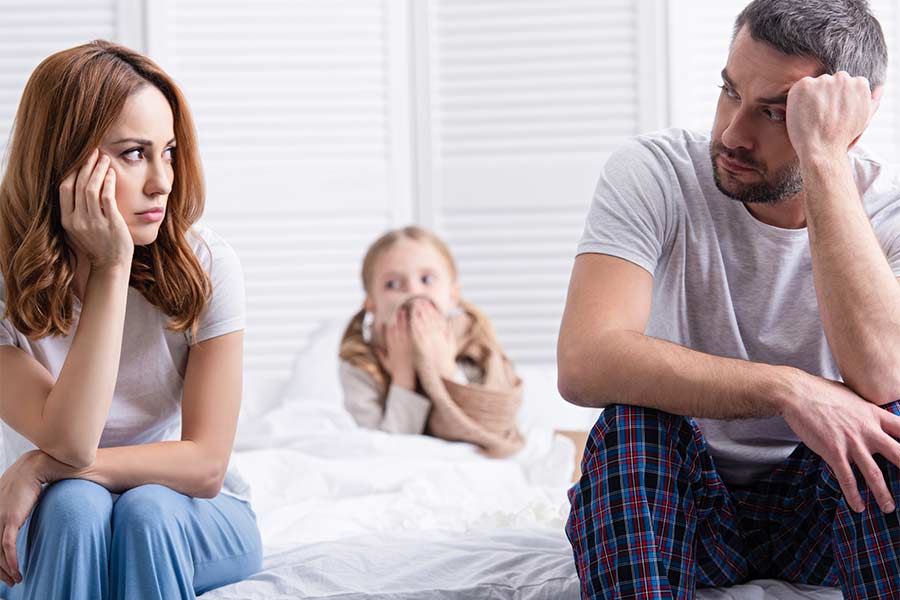Why a calm parent is the key to a sleeping baby

You think you’re anxious BECAUSE your baby is not sleeping well? The opposite might be true.
Kids look to their parents for information on how to interpret situations.
Even parents with the best of intentions can find themselves passing on their own stress to their children. There is plenty of evidence supporting this but, if you are an anxious parent, there is no need for you to feel guilty.
Most of the times, anxiety is not easy to turn off. But, if we want our kids to thrive in their lives or – simply – to sleep well, there is something we can do to avoid the transmission of anxiety from parent to child.
When it comes to sleep, something that I have come to experience both with my own kids and working with hundreds of families, is that, for some reason, sleep tends to have a higher emotional impact compared with other aspects of a child’s life.
Maybe that’s because, before we became parents, we were presented with stereotypical images of adorable sleeping babies that are simply not realistic but still get stuck in our minds as an ideal that we unconsciously want to attain.
Another reason can be found in the tendency of many parents (especially first time ones) to associate dramatic meanings to the cries of a baby in their crib. We usually don’t know why our newborns are crying and immediately think that they’re crying for hunger, pain or separation anxiety. As a Dunstan Baby Language Educator, my job is to teach soon-to-be or new parents how to identify the different types of babies’ cries and their meanings so that they can act effectively with no need to guess. And this has proved to reduce parental anxiety significantly in the first stages of a baby’s life.
But, in some other cases, parents project their own feelings onto their babies when they are crying. If we think about a mom who just gave birth and is experiencing huge hormonal shifts that make her feel ALL the feelings, it is pretty easy to understand why that happens.
The reality is that babies sense their caregivers mood. If you are super worried or upset because your child is taking a long time falling asleep or woke up several times during the night, it is more likely that he or she will model your feelings and find it harder to soothe. This is because babies can’t self-regulate and are looking for cues on how to approach their experiences.
When I first meet with parents for our initial consultation before we start a sleep training or – as I like to call it – a sleep accompaniment journey, I can already tell whether they will struggle through the program or see results right from the very first nights depending on how anxious or confident they seem.
Unfortunately, anxiety can seriously hinder our judgement and decision making. Moreover, anxiety doesn’t disappear overnight. It can be triggered by sleep deprivation which in turn can be caused by the fact that baby is sensing a parent’s bad mood and – as a consequence – finds it difficult to sleep well. In fact, a 2014 study shows that mothers and infants can reciprocally influence each other’s psychological reactions.
So what can an anxious parent do to better support a child when it comes to falling and staying asleep?
Dr Jodi Mindell, a psychologist and associate director of The Sleep Disorders Center at The Children’s Hospital in Philadelphia and author of an amazing book titled “Sleeping Through the Night”, has listed a series of relaxation strategies that parents can try to feel calmer when they approach bedtime.
These include:
– Progressive Muscle Relaxation – to become more aware of physical tension;
– Diaphragmatic breathing – that reduces blood pressure and heart rate to improve overall relaxation;
– Guided imagery – where your imagination can be used to picture a happy place, time or experience that makes you feel calm and peaceful;
– Yoga – to create mental clarity and body awareness;
– Meditation – that has proved to be particularly helpful in achieving an emotionally calm state.
I perfectly know that, to a practical person, these techniques might seem like a waste of time, but I can’t stress enough the importance of being relaxed both to your own wellbeing and to that of your children. The calmer you are, the calmer your baby will be and the process of teaching them to sleep (whether through proper sleep training or opting for different strategies that you feel more comfortable with) will go faster and smoother.
However, if you feel like these strategies are not enough or that your parental anxiety is too severe, please remember that there is nothing wrong in seeking professional help. Therapy can be very useful to those parents who feel burnt out and need to diver deeper into the causes of their anxiety.
Being a parent is the most amazing experience but it can be overwhelming and exhausting (especially with the million other stressors in our daily lives). By healing ourselves, we are making sure that we can be the best caregivers to our children.
So, if your child’s sleep is all over the place and you feel stressed and depressed and are considering embarking on a sleep journey to finally teach them how to sleep well, it is very important that you work on your own anxiety first.
– Sara




